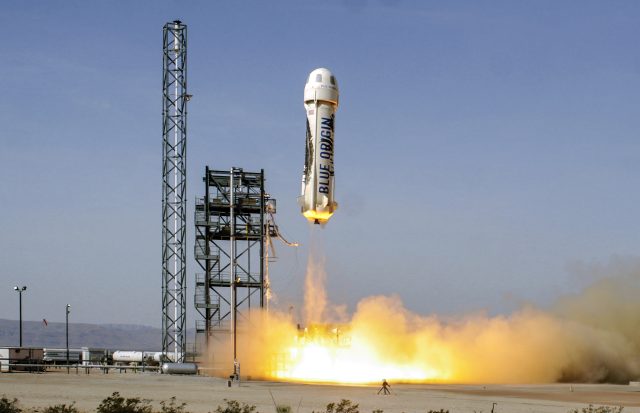Suborbital spaceflight cachet —
The bidding will culminate in a live auction on June 12.
Eric Berger
–

Blue Origin’s New Shepard launch system takes flight.
Blue Origin
On Wednesday morning, Blue Origin unsealed the high bid for its auction of a spaceflight seat. The bid of $1.4 million soon rose to $2 million. As of this writing, it is at $2.4 million.
The auction is for one seat on the first flight of Blue Origin’s New Shepard launch system. This autonomous vehicle—a rocket and capsule that ascends to an altitude above 100 km—has six seats for passengers. The company plans to fly its first mission on July 20.
Blue Origin has not said who else will be flying onboard this first mission or whether the passengers will include Blue Origin founder Jeff Bezos.
The unsealed online auction for this seat will continue until June 10. Then, on June 12, the company will hold a live online auction among verified bidders to finally sell the seat. The company said the winning bid amount will be donated to Blue Origin’s foundation, Club for the Future, to inspire future generations to pursue careers in STEM and help invent the future of life in space.
Beyond this auction, Blue Origin has not released pricing for New Shepard flights—either for individual tickets or for an entire mission. However, a well-placed source told Ars that the per-seat price would be “well north” of $500,000 and much closer to $1 million for the first several flights.
The current bid above $2 million speaks to the demand for suborbital spaceflight—passengers on New Shepard will experience the thrill of a rocket launch and several minutes of weightlessness—as well as the cachet of flying early in the program.
With New Shepard, Blue Origin will be charging well above the original price, $250,000, that competitor Virgin Galactic charged for seats on its suborbital space plane. This may be partly because New Shepard will go above the Kármán line of 100 km, compared to about 80 km for Virgin Galactic.
Bezos’ company may also be able to charge a premium for flights now because Virgin Galactic is not yet ready to fly commercial passengers on its VSS Unity spacecraft, which remains in a testing period. The company has not said when VSS Unity will begin flying paying customers, but it now seems likely this date will slip into 2022.

